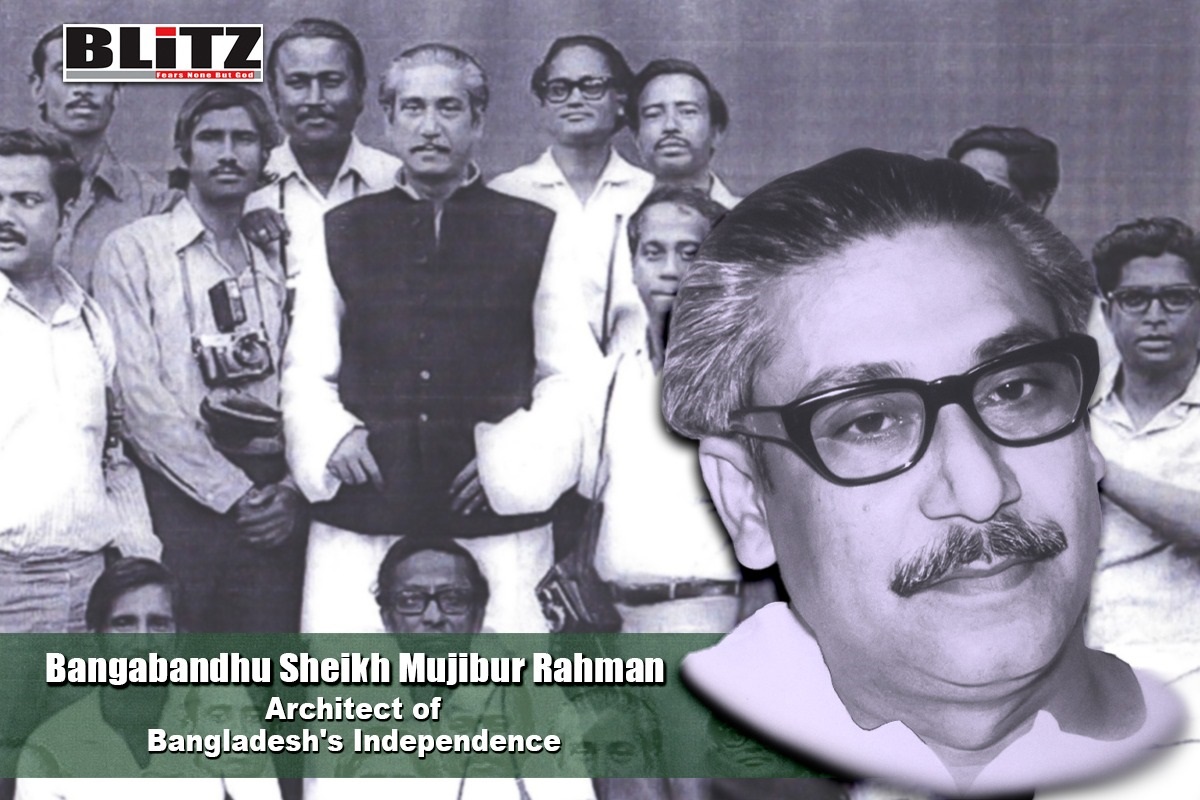Bangabandhu Sheikh Mujibur Rahman: Architect of Bangladesh’s independence
- Update Time : Sunday, March 17, 2024

Bangabandhu Sheikh Mujibur Rahman, revered as the Father of the Nation in Bangladesh, lived a life dedicated to the emancipation and prosperity of his people. Born on 17 March 1920, in the village of Tungipara, his journey from a humble beginning to becoming an iconic leader is a testament to his resilience, vision, and unwavering commitment to the cause of his nation.
Growing up in a politically charged environment, Sheikh Mujib’s early years were marked by a fervent desire for social justice and equality. Despite facing personal setbacks, such as a hiatus in his education due to an eye operation, Sheikh Mujib’s passion for serving his community only grew stronger. His marriage to Begum Fazilatunnessa and the subsequent birth of their five children added depth to his personal life, shaping him into a compassionate and family-oriented leader.
Bangabandhu’s political career blossomed in the late 1930s when he emerged as a vocal advocate for the rights of his fellow citizens. His activism gained momentum as he joined the All Bengal Muslim Students League and later played a pivotal role in the formation of the Awami Muslim League. By the 1950s, Mujib had become a prominent figure in the political landscape of East Pakistan, tirelessly advocating for Bengali autonomy within the framework of a united Pakistan.
Throughout his remarkable journey, Sheikh Mujib encountered a myriad of challenges, enduring multiple incarcerations and relentless political persecutions. Yet, amidst these trials, his spirit remained unbroken, and his dedication to his principles unwavering. This resilience shone brightly during his involvement in the Agartala Conspiracy Case, where he faced accusations of conspiring against the state. Despite the adversity he faced, Mujib emerged as a beacon of hope and resilience, inspiring the Bengali people with his unwavering commitment to their cause and his steadfast determination to uphold their rights and aspirations.
Mujib’s crowning moment came in 1970 when the Awami League secured a landslide victory in Pakistan’s first general elections. However, the joy of electoral success soon turned into a struggle for survival as the ruling establishment conspired to deny the Bengali majority its rightful mandate. In the face of mounting oppression and violence unleashed by the Pakistani military, Bangabandhu Sheikh Mujib took the historic step of declaring Bangladesh’s independence on 26 March 1971.
The ensuing nine months of the liberation war were a testament to the immense sacrifices and unimaginable atrocities endured by the Bengali people, culminating in the historic birth of Bangladesh on 16 December 1971. Throughout this tumultuous period, Bangabandhu Sheikh Mujib’s leadership served as a beacon of hope and inspiration, solidifying his status as the undisputed leader of the Bengali populace. His unwavering commitment to the cause of liberation rallied millions behind him, fueling their determination to secure freedom and self-determination. The jubilant return of Mujib to a liberated Bangladesh on 10 January 1972 was a momentous occasion, symbolizing the triumph of the human spirit and the collective efforts of those who had fought tirelessly for their independence under his visionary guidance.
Assuming the role of Prime Minister, Bangabandhu Sheikh Mujib embarked on the daunting task of rebuilding a war-torn nation and laying the foundations of a democratic society. His vision for a progressive and inclusive Bangladesh was reflected in the adoption of a new constitution and the establishment of democratic institutions. However, his efforts to transform the country faced numerous challenges, including internal strife and economic instability.
Despite encountering setbacks, Bangabandhu Sheikh Mujibur Rahman persisted in his unwavering dedication to fulfilling the hopes and dreams of his people. As the year 1975 dawned, he embarked on a series of transformative reforms designed to fortify governance structures and secure social equity for all citizens. However, his ambitious endeavors, which included the proclamation of a Second Revolution through constitutional adjustments, encountered resistance from entrenched factions intent on obstructing the path toward a more democratic society. Despite these challenges, Bangabandhu’s resolve remained unyielding as he pressed forward in his quest for a fairer and more prosperous Bangladesh.
Tragically, Bangabandhu Sheikh Mujib’s life was cut short on 15 August 1975, when he and most of his family members were brutally assassinated in a coup d’état. The loss of Bangabandhu Sheikh Mujibur Rahman was a devastating blow to Bangladesh, plunging the nation into a period of uncertainty and turmoil. However, his legacy endured, inspiring future generations to carry forward his vision of a free, prosperous, and democratic Bangladesh.
As Bangladesh commemorates the life and legacy of Bangabandhu Sheikh Mujibur Rahman, it is essential to reflect on his enduring legacy of courage, resilience, and unwavering commitment to the cause of his people. His life serves as a beacon of hope and inspiration for all those who strive for justice, equality, and freedom in the face of adversity. In honoring his memory, let us reaffirm our dedication to building a society that upholds the principles and values for which he sacrificed his life. Bangabandhu may have left this world, but his spirit lives on in the hearts of millions, guiding Bangladesh towards a brighter and more prosperous future.














Leave a Reply